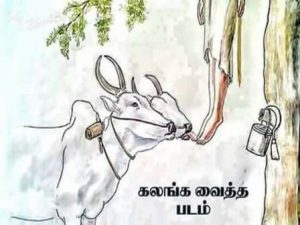Climate Change and Farmers’ Suicides in India: Unpacking Policy Options
Millions of farmers and their families, who have the least carbon footprint in the world, are paying for the crimes of others, which have resulted in climate change over the years. It is too late to ask whose fault it is, but it is not too late to help and intervene to reduce the suicide rates.

The sight of skulls and bones placed by farmers of Tamil Nadu at Jantar Mantar in New Delhi in 2017 was an unspeakable image. The farmers, who faced the worst drought in 150 years, did that as a plea and protest to the Indian government for farm debt waivers.
Climate has the power to give or take lives. Climate change has resulted in enduring distress and depression among farmers, and it led to more than 59,000 suicides in India in the last three decades. According to a recent study, one degree Celsius (1.8 degree Fahrenheit) increase in temperature resulted in 65 suicides across India and suicide rates increased five-folds with increase in temperature by 5 degree Celsius during the agricultural season. Climate change was the critical link, as these trends decreased in off-season explaining India’s evolving suicide epidemic.
Also Read : Secure Land Rights Critical For Asias Rural Communities Threatened By Covid 19
Agriculture is central to India’s GDP, as 50 per cent employment depends on it. However, with floods, droughts and unpredictable seasonality, climate change has made the country’s agricultural sector vulnerable in last two decades. Suicide rates have doubled since 1980 due to high temperatures and low rainfall during the growing season, thereby claiming more than 130,000 lives each year. According to the experts the number of climate change-linked suicides was underreported in India until 2014, as committing suicide was a criminal offence. It is shocking to see hardworking farmers take their own lives because of growing debts which they were not able to pay. It is heartbreaking to imagine what a family goes through after the pillar of the family falls due to inability to feed his/her children. Millions of farmers and their families, who have the least carbon footprint in the world, are paying for the crimes of others, which has resulted in climate change over the years. It is too late to ask whose fault it is, but it is not too late to help and intervene to reduce the suicide rates.

Life education programmes for farmers are essential to rescue them from the vicious trap of their spiraling debt, which leads them to suicides. Farmers should be provided mental health counselling. Although it is the tip of the iceberg, it is a necessary preventive step to reduce psychological versus socio-economic suicide rates in India. It indicates that the Indian government needs to formulate better policies to support farmers and their families financially as more than one-third of its workers earn below the international poverty line. It is important to reduce the socio-economic risk involved in growing food crops in vulnerable climates. Although the Government of India has established one billion worth of crop insurance plan to reduce the suicide rates, its functional efficiency is questionable with 2-degree Celsius increase in temperatures annually resulting in heat waves, droughts and unpredictable monsoon.
Also Read : Worlds Earth Day Call For Acting Against Climate Change
Climate change has caused a ripple effect, which has resulted in high food prices due to poor crop yields, decrease in natural resources like reduced levels of ground water and soil erosion. Even 1.5 to 2 degree Celsius increase in temperatures can disrupt the stability of water resources thereby threatening the major food baskets of India like Maharashtra, Punjab, Haryana, Uttar Pradesh and Tamil Nadu by 2050 thereby aggravating poverty and food insecurity. As per the projections, the food prices between 2000 and 2050 will be 2.5 times higher for major food crops like rice, wheat and maize resulting in GDP loss of 8.7 per cent by 2050, thus creating havoc among the farmer community. Therefore, it is important to understand the impact of climate change in agriculture and on farmers to enhance the sustainability of agriculture, and design policies keeping the vulnerabilities of farmers towards climate change in mind. Future policies should enhance crop insurance, weather insurance, land insurance for farmers to promote adaptation and protection against climate change, provision of better resources and training to sustain food security against the high food price fluctuations. Studies have shown that farmers should be encouraged to have diverse livelihood portfolios and should be provided with better access to multiple resources to adapt and cope with poverty and climate risks.
In addition, the government needs to promote cost-effective and innovative methods like crop diversification and crop rotation to build the resilience of Indian agricultural system. Diverse production systems are important to regulate the ecosystem services such as soil erosion control, nutrient cycling, reduction in greenhouse gas emissions and control of hydrological processes. All these methods can promote crop diversity strengthening the production system, enhancing not only food and nutritional security, but also human security in the face of climate change. Despite available resources and options, inefficient institutions, lack of financing might hinder Indian agriculture to tackle the climate challenges in the future. It is pertinent that the policy makers are to invest in scaling up the reforms for agricultural and rural development. The government should address the issue of climate change with a greater sense of urgency to support the farmers who in turn are responsible for putting food on our tables. The country is now facing both the economic crisis and uncertainties of the COVID-19 pandemic. Rebooting the agriculture sector along with the other primary sectors are the measurable options before it to come out of the mounting crisis.
